The annual cycle of events dedicated to the 150th anniversary of A.Yu. Krymsky ends on January 15, 2022.
Over the last year, dozens of scientific conferences, hundreds of meetings, round tables, webinars, and exhibitions have been held in Ukraine.
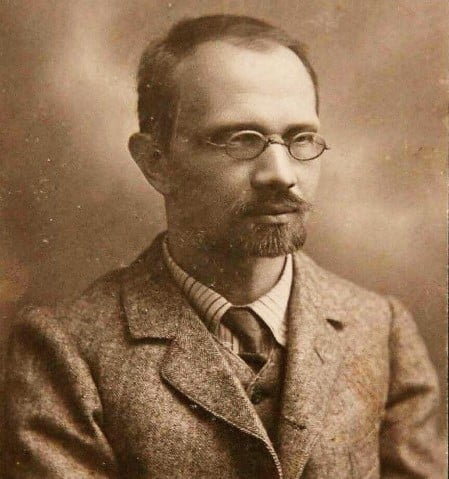
Conferences were held in Volyn where he was born, with the participation of the A.Yu. Krymsky Institute of Oriental Studies of the National Academy of Sciences of Ukraine and universities – National University “Ostrozka Academiia”, Lesya Ukrainka Volyn National University, Rivne State University for the Humanities, A.Yu. Krymsky Volodymyr-Volynsky Pedagogical College, Volyn Institute of Postgraduate Pedagogical Education and other organizations.
Many events were held in the Cherkasy region; Agatangel Krymsky went on a pilgrimage from this land across the world and his doleful road to Golgotha began from here.
People abroad also responded to the round anniversary. The embassies of Ukraine and the countries of the Oriental world participated in the events dedicated to the 150th anniversary of Krymsky. The webinar “Predictor of Multiculturalism in Ukraine” was held by the Institute of Oriental Studies with the support of the Embassy of Ukraine and in cooperation with the MUSLIM Institute in Islamabad. In Lebanon, the Institute of Oriental Studies and the American University of Beirut with the support of the Embassy of Ukraine, held an international scientific conference “Agatangel Krymsky and Lebanon”.
The final international scientific conference “To the 150th anniversary of Academician A. Yu. Krymsky” was held under the auspices of the National Academy of Sciences of Ukraine, the V.I. Vernadsky National Library of Ukraine, O.O. Potebnya Institute of Linguistics of the NAS of Ukraine and the A.Yu. Krymsky Institute of Oriental Studies of the NAS of Ukraine, the partners were the Yunus Emre Institute in Kyiv, the Baku International Center for Multiculturalism and the Helvetica Publishing House.
Ambassador Extraordinary and Plenipotentiary of the Republic of Turkey to Ukraine Guldere Yagmur Ahmet and Ambassador Extraordinary and Plenipotentiary of the Republic of Azerbaijan to Ukraine Elmira Hussein-Kizi Akhundova took part in the conference. Welcoming the audience, the Ambassador of Azerbaijan said that her country highly respects Agatangel Krymsky as a founder of Ukrainian Azerbaijani studies and, in particular, a scholar who studied the heritage of the classic of Azerbaijani poetry Nizami Ganjavi. This year is the Nizami year in Azerbaijan, and the translation of the significant research “Nizami and his contemporaries” by Agatangel Krymsky was recently published in Baku.
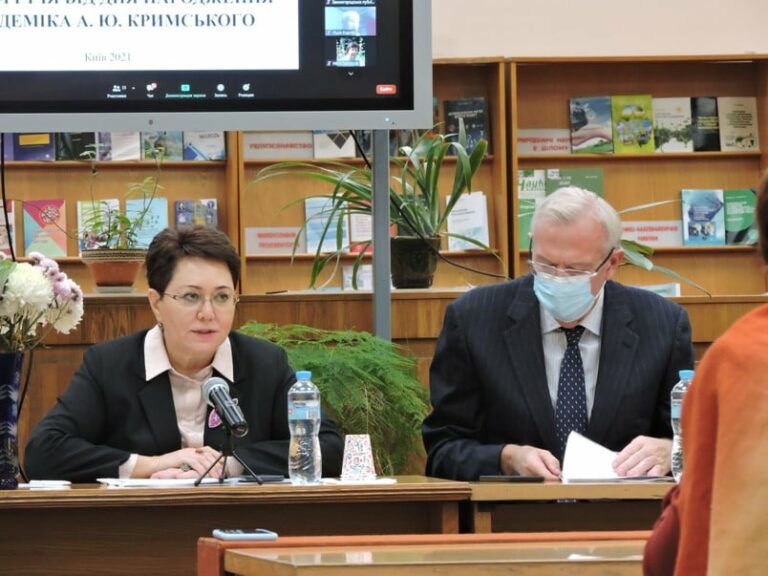
The co-author of the translation – Takhmina Badalova, a leading researcher at the Nizami Ganjavi Institute of Literature of the National Academy of Sciences of Azerbaijan – came from Baku to speak at the conference and donate the excellently printed Azerbaijani translation of the work of A.Yu. Krymsky to the V.I. Vernadsky National Library of Ukraine.
Apparently, this year Agatangel Yu. Krymsky was spoken of more than it was said about him in all the years since his name emerged from oblivion, and society recovered from the lethargic sleep in which it was plunged by the communist government, trying to hide what it did to one of the most educated, phenomenally gifted and incredibly hard-working, ingenious scientists and organizers of science in Ukraine. As with thousands of other talented and loyal citizens of Ukraine, though.
Is it enough to fill the gaps in our memory in the knowledge of Agatangel Krymsky, his role in the life of the country, society, the establishment of the Ukrainian Academy of Sciences, raising the international image of Ukraine and even paving new paths in our relations with countries of the Orient?
Probably, not enough. We have a great debt of gratitude to Agatangel Yu. Krymsky, which must be paid. We must collect and preserve his legacy – at least what is left of it, publish a complete collection of his books, papers, translations, scientific research…
And on top of that – find that place where one can pay a last tribute to him: lay flowers, bow and make an acknowledgment.
PERCEPTION
General impression of Krymsky: man-colossus, unique person, universe. Omelyan Pritsak, his student and prominent orientalist, giving a sense of the lecture given by Krymsky in the largest hall of Lviv University, wrote: “Agatangel Yu. Krymsky spoke for about an hour and a half, and even a fly didn’t move in the hall, all attentively listened to convincing arguments of the venerable scholar.”
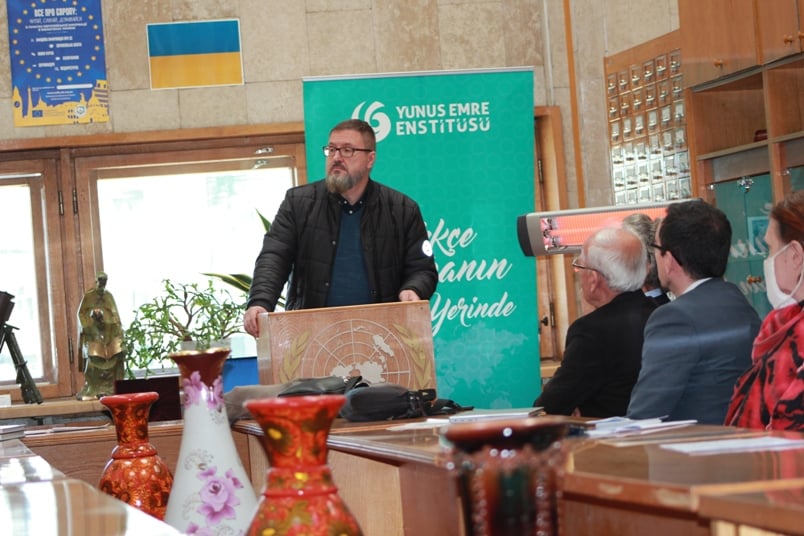
Such persons of keen intellect were at the origins of the Ukrainian academy and Ukrainian science. Mykola Vasylenko, the Minister of Education in Skoropadsky’s government, and Agatangel Krymsky discussed the idea of a future Academy in April 1918. The first President of the Ukrainian Academy of Sciences V.I. Vernadsky called Krymsky as a system organizer out of Moscow for structuring the Academy.
Founded in November 1918, the Academy with its problems and challenges, to a great degree, was supported by A.Yu. Krymsky. Krymsky was its indispensable Academic Secretary with 6 Academy’s Presidents in sequence. And Krymsky kept his position; jokingly the Academy was called Krymska, and not without reason.
How did they live then? Well-known historian, Professor Nataliia Polonska-Vasylenko wrote: “The financial situation of the Academy was terrible. None of the authorities provided it not only with the opportunity to work normally, but even with the “cost-of-living allowance” necessary for its staff to avoid starvation. From time to time, Krymsky acquired various kinds of “natural” values: some clothes, some potatoes, some food. He had to make a stock of firewood, to garden, which could help maintain families (…). But here, in cool rooms, (hungry) enthusiasts of Ukrainian science gathered, in faded coats, with frozen, cracked hands; warmed by love for Ukraine, they drafted plans to develop Ukrainian science (…). On the reverse of calendar pages, on old theatrical posters – because there was no paper – they wrote their works using pencils dissolved in water as ink…”
Giving the paper “Agatangel Krymsky, the founder of the National Academy of Sciences of Ukraine and the National Library of the Ukrainian State”, prepared together with Academician of the NAS of Ukraine Oleksiy Onyshchenko, Director General of the Library, Corresponding Member of the NAS of Ukraine Lyubov Dubrovina said that the Academy was not funded until 1923.
Mykola Vasylenko, Minister of Education under the Hetman’s government and then President of the Ukrainian Academy of Sciences, wrote in his letters to Volodymyr Vernadsky: “The great merit of A. Yu. Krymsky is that the Academy was saved.
I have to testify it openly, honestly.”
Agatangel Yu. Krymsky also conducted a great scientific work. He worked 18 hours a day. At the Academy of Sciences, he headed the Department of History and Philology, the Cabinet of Arabic and Iranian Philology, the Commission on the Dictionary of the Living Language, the Commission on the History of the Ukrainian Language, and the Dialectological and Spelling Commission. From 1921 he headed the Institute of Ukrainian Scientific Language (today – O.O. Potebnya Institute of Linguistics of the NAS of Ukraine), taught Ukrainian studies, oriental studies, world history at T.G. Shevchenko Kyiv University. Under his leadership, the first edition of the fundamental work “The most important rules of Ukrainian spelling” was published.
“He was a man of encyclopedic knowledge, broad horizons, firm life position… He was phenomenally gifted, Krymsky’s scientific interests were boundless,” – said Academician Secretary of the Department of History, Philosophy and Law of NAS of Ukraine, Academician Valeriy Smoliy, speaking at the conference.
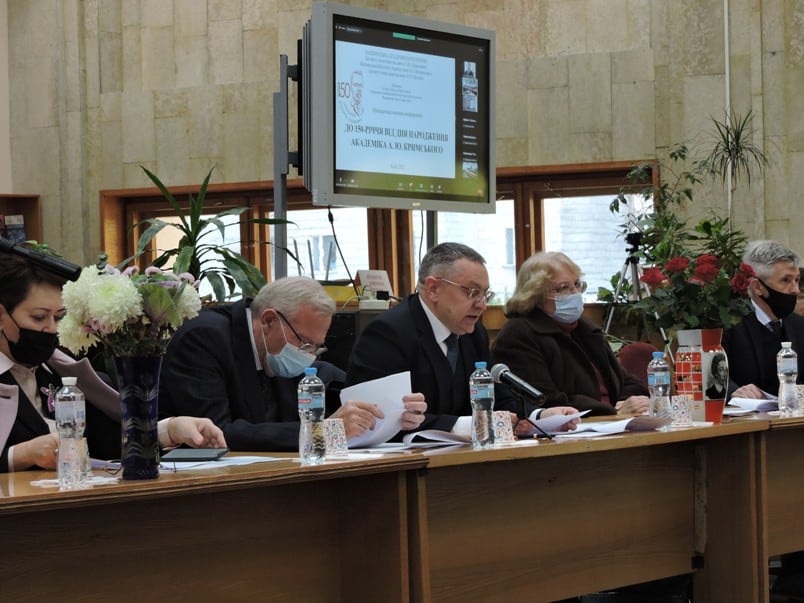
Is it necessary to say that the Central Committee of the Communist Party (b) of Ukraine had a completely different point of view? In one of the reports in the 1920s (Academician Yuriy Shemshuchenko gives this information in the Bulletin of the National Academy of Sciences of Ukraine, №6, 2006), the author of the denunciation stated that “there is a large group of academicians who do not carry out any scientific work and do not give any benefit to the Academy “. And among them – A. Krymsky, D. Yavornytsky, M. Vasylenko and other celebrated personalities in Ukrainian science were mentioned.
The party cadres certainly could not like that Krymsky rejected the thesis of a “common cradle of three fraternal peoples”, claiming that the Ukrainian language appeared in the 11th century “as a fully prominent, fully defined, brightly individual unit.”
FROM THE BEGINNINGS
“I belong to the Turkic-Tatar tribe. My ancestor, a Crimean mullah, was a relative of the Crimean khan, in 1696 he left for Lithuania. He found himself among the Christian people, adopted Christianity. He was baptized under the Christian name of Pavlo and, given that he came from the Crimea, people began to call him Krymsky”, Agatangel Krymsky said in an interview on September 13, 1915.
Mullah’s son Stepan studied at the Smolensk Theological Seminary, although he was soon excluded from the seminary for his freedom-loving nature. He self-studied several languages, gathered up about 2,000 books, including many Turkish and Arabic manuscripts.
Stepan’s son and Agatangel’s father Yukhym read all the books from his home library, he knew Russian, Arabic and Turkish. In the late 60’s of the 19th century he settled in Volodymyr-Volynsky, worked as a teacher, taught history and geography. He married Aglaida Sydorovych, a “Lithuanian Polish” girl. Agatangel mentioned that his mother spoke the northern dialect of the Ukrainian language. Their son was given a Greek name: “Good Messenger”.
The family had two children when Yuhym Krymsky received a fee for writing a textbook on geography, he bought a house in Zvenigorodka, now Cherkasy region, and moved there together with the family.
“Krymsky has a golden gene pool,” Bohdan Yanovych, a researcher at the Volodymyr-Volynsky Historical Museum said during a zoom conference hosted by the Ukrainian Institute of National Memory. “Starting with the mullah, all the men in his family knew several languages, had large libraries and adhered to the slogan “Learn and know!”.
In fact, from the age of three and a half, reading became a major hobby for the boy, which did not contribute to his physical health and normal vision. (In adult life, he tied two pairs of glasses together and read and wrote this way). From the age of 5, as he wrote in the autobiography, he studied at the Zvenigorodka secondary school. From the age of 10 he continued studies at the Ostroh Gymnasium; he lived in Ostroh “under the care of his old aunt”, who was in charge of the public library, where he could “stay unrestrainedly from morning till night”.
Then he studied at the 2nd Kyiv Gymnasium, entered the Galagan College; later Krymsky called it his “great school of life.” He said that tuition fees were very high there, so “proletarians take the competitive exam”. The two camps – “at own expense” and students receiving scholarship – hated each other, but Agatangel managed to position himself in such a way that “our aristocrats did not dare to touch me, but I was weak and felt oppression over the grant-aided students more clearly compared with other.”
He was the first student in the College. By the time he graduated, he had mastered 15 languages. At home he learned Polish, French, English and German. In College he mastered Greek, Italian, Turkish, he was fluent in Hebrew and Sanskrit. In his later years he spoke several dozen languages. There is information in some publications that he knew up to a hundred languages. His humorous answer is well-known: “It’s easier for me to list the languages I don’t know.” His memory was phenomenal. He even complained, “I can’t forget anything.”
In the Galagan Collegium, he, “an alien by the nature, became a Ukrainian forever.”
Biographers explain this by the influence of his teacher, a prominent scientist, historian of the Ukrainian language, Professor Pavel Zhytetsky. Krymsky’s acquaintance with Lesya Ukrainka, Ivan Franko, Mykhailo Drahomanov dates back to the same period…
However, Agatangel Krymsky later said that he became the Ukrainian to the fullest extent in Moscow, where he entered the Lazarev Institute of Oriental Languages and then the Faculty of History and Philology of Moscow University. “Once I took Fedkovych’s story with Drahomanov’s foreword,” he wrote, “I took it, read it, and a new light dawned upon me. I understood that I had to be a Ukrainophile, I understood it quite consciously. I greedily clung to Ukrainianness. I devoted every hour free from official classes to Ukraine. The first sign of nationality is language, and I first cared about it, thoughtfully read all kinds of books, paid special attention to ethnographic materials, reread all sorts of philological works.
In a letter to Ivan Franko he wrote: “Ukrainianness grew into me organically, without my knowledge”
LEBANON! .. HAPPY AND BELOVED LAND!
At the Institute of Oriental Languages, Krymsky mastered about fifteen Oriental languages in three years and wrote fundamental scientific works. It gave him the opportunity to continue studies at the Department of Arabic Philology.
“But could he study the Orient without visiting it? Krymsky won the Lazarev Scholarship for two years for a trip to the East, and for two years he lived, worked and made research in Lebanon”, Maryna Hrymych, Doctor of Historical Sciences, writer, researcher of Agatangel Krymsky’s writing, says. She joined the Zoom Conference “Agatangel Krymsky – obliterated phenomenon” organized by the Ukrainian Institute of National Memory, from Beirut.
The scientist stayed in Lebanon in 1896-1898. The result of his work was presented on his return on thousands of pages, Maryna Hrymych said. But he was not a fan of descriptive narratives, of these “pharmacy-accurate texts”, he was interested in the rules of word use, in methodology. Accuracy and scrupulousness were his features both in scientific research and staff work at the Academy. In Lebanon, he described everything he saw just accurately, meticulously and precisely, commenting on people, events, customs… He lived in the old and poor part of Beirut, where the Orthodox population lived. (It is this area that was badly damaged during the recent explosion.)
His living conditions were “not very good”, but when he was offered another apartment, Krymsky refused, saying that thanks to him the owners would improve their financial situation at least a little. This is real Krymsky too.
During his stay in Lebanon, he wrote about 180 letters, 150 of them are letters to relatives and about 30 – to friends and colleagues. He also wrote “Beirut Stories”, and recently the people of Beirut and Lebanon received the opportunity to read them. The book was translated into Arabic by the famous Lebanese translator Imadeddine Raef.
“Beirut Stories” has become an event in Lebanon, the publishing house prepares its second edition… There were a few works about the lives of common people in the late 19th century. And these household details that Krymsky noticed, descriptions of the parts of old Beirut, old names, customs, became a real discovery for the Lebanese”, Maryna Hrymych says.
Another discovery was the photo exhibition in the mountain town of Choueir, where Krymsky used to spend a lot of time during hot summer months. There was an Orthodox school in Choueir where the pauper children studied, and Krymsky arranged the way to help the school with the Russian consul. Once Krymsky hired a photographer and organized a kind of photo session: they took photos of students, school, houses, slopes… The Embassy of Ukraine in Lebanon organized the exhibition of unique archival documents and photographs transferred from the V.I. Vernadsky National Library of Ukraine and the National Literature and Art Archive-Museum of Ukraine. It is difficult to express the interest and enthusiasm of today’s Choueir inhabitants when they viewed historical photographs.
The Ukrainian Embassy initiated the creation of the Agatangel Krymsky Museum in this mountain town. The municipality supported the idea, the premises were given for it, and we hope that the museum exposition will be inaugurated soon. According to the Ambassador Extraordinary and Plenipotentiary of Ukraine to Lebanon Igor Ostash, Agatangel Krymsky returns to Lebanese land.
THE MAIN MATTER OF LIFE
In the middle of 1898 A. Krymsky returned to Moscow, took the place of a private associate professor of Arabic philology in special classes of the Lazarev Institute, managed the library of the institute, and lived there for some time.
In the autumn of 1900, thirty-year-old A. Krymsky was elected professor of the Department of Arabic Literature at the Lazarev Institute, and the next year he headed it.
During his teaching at the Lazarev Institute, Krymsky published a whole library of academic textbooks on philology and history of the Middle East, on the Koran, Islam, courses in history and literature of the Arabs, Persians and Turks.
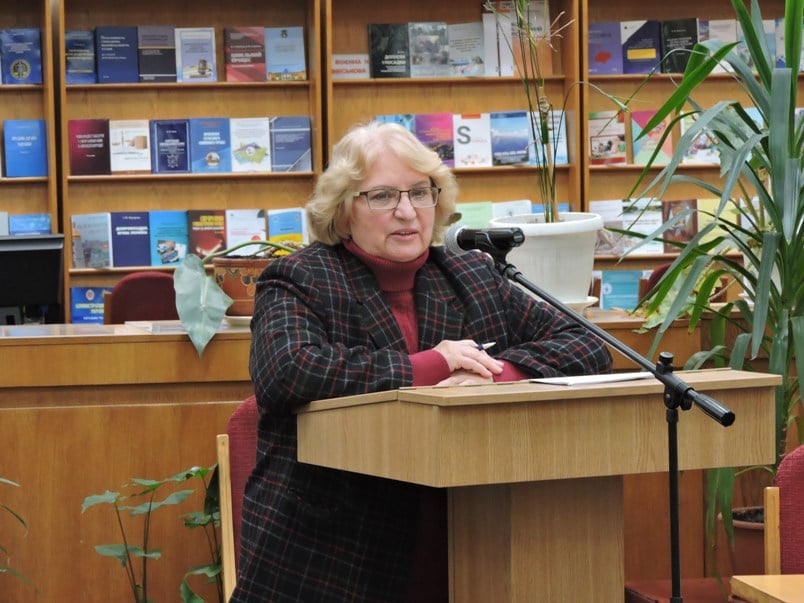
At the beginning of the 20th century A. Krymsky had the good reputation as an orientalist and specialist in Slavic studies. Many of his works were translated into European languages. The editors of the Encyclopaedical Dictionary of Brockhaus and Efron asked him to write columns on Arabic, Iranian studies and Turkology. Since 1915 he began to edit the journal “Works on Oriental Studies”.
… However, apocalyptic processes began in the Empire from the beginning of the century. “A spark will kindle a flame”.
Year 1905 – Russia’s defeat in the war with Japan, the revolutionary protests in 1905, the First World War, year 1917… The Bolsheviks come to power in Russia.
It would seem that Krymsky should be far from it. He was 46. He was completely dedicated to science. He was a world-renowned scientist. He had a job worthy of his status, and he had extremely poor health: heart disease, asthma and very poor eyesight. But all these years he closely followed the Ukrainian affairs, maintained correspondence with friends and colleagues, and watched the unfolding revolutionary development.
When Volodymyr Vernadsky asked Krymsky to return to Kyiv and become one of the founders of the Ukrainian Academy of Sciences, the latter made only one condition. V.I. Vernadsky recalled: “I had to bring Krymsky in a freight car from Moscow to Kyiv, because he agreed to go “forever” to Kyiv with all his large library.” In addition to books, Agatangel Krymsky, who loved opera music, brought to Kyiv a collection of gramophone records and stamps.
We have spoken about the intensity and scale of Krymsky’s work above. In her report at the conference, Lyubov Dubrovina said: “When you read the minutes, you see the daily Academy-support work, then you understand: it was incredibly difficult, incredibly harassing and incredibly responsible work.”
She said that Krymsky had the talent to persuade, to work with government officials, especially when it was necessary to release one of the scientists from the prison, protect and support him. Thus, Mykola Vasylenko, one of the founders of the Academy, who was accused of hostile activity, was saved from probable death by collecting signatures.
Witnesses recall that in February 1925, when the Bolshevik government had already put some scholars on notice, Agatangel Krymsky declared at the General Assembly of the Academy, that he was a communist sympathizer.
Whereat Serhiy Yefremov wrote in his diary: “What’s the object of saying that? He is a communist like I’m the Tibetan Dalai Lama.”
Krymsky knew the reason for saying those words: it allowed him to defend the interests of the Academy and scientists in party offices. This was probably the limit of acceptable compromise for him… Although he was well aware that “protection” would be short-time.
However, there could be no compromise when it touched on scientific work. He did not spare himself, and demanded from others the same clarity, accuracy, scrupulousness in everything related to science.
In the 1920s, 15 terminological dictionaries were published under the auspices of the Academy. A. Krymsky’s reputation guaranteed a high scientific level of any publication. He painfully perceived everything that harmed language. Seeing that the Ukrainian part of the Russian-Ukrainian dictionary (in which Kaganovych himself was interested) was Russified, Agatangel Krymsky refused to take part in its further elaboration. “I resolutely recuse myself from participation … in the dictionary, where those who cripple and litter language are recklessly ambling, while people full of the best intentions … do not dare to give a sharp rebuff to these adventurers (…). My name should not appear in that publication”, he said firmly.
The years 1918–1929 were the golden age of Ukrainian science, especially for the humanities and social sciences. Works with inscription: “Allowed for publishing. Indispensable Secretary of the Academy, Academician Ag. Krymsky”, – caused full trust in scientists not only of Ukraine.
HARD TIMES
Meanwhile, clouds grew heavier over the Academy and over Krymsky. In 1929, a trial fabricated by the Soviet authorities against the non-existent underground organization, the Union for the Liberation of Ukraine, began to gain speed. Serhiy Yefremov, Vice-President of the Ukrainian Academy of Sciences, was arrested, and about ten other scholars of the All-Ukrainian Academy of Sciences were labeled as members of the “organization”.
Krymsky was not touched, although he was ready for his arrest. He was hassled through his assistant and adopted son Mykola Levchenko. Apparently, the authorities were not ready to arrest him yet. Researchers say that at that time Mykola Levchenko with his testimony saved his named father and teacher. Mykola asked Krymsky to adopt his son Mykolko so that he would not grow up as the son of an “enemy of the people.”
Krymsky wrote many letters to various authorities to soften his fate. In 1936, Mykola returned from the camps very ill and a few days later committed suicide.
In 1929, Agatangel Yu. Krymsky was not approved as an indispensable secretary of the Academy, then he was deprived of research and teaching work. He lived very poorly. When he was in Kyiv, he sent every kopeck to Zvenigorodka, where his relatives and the named son Mykolka lived; he used to eat lunch in the dining room and take two pieces of bread with him.
In 1937, the authorities “refreshed memory” about the academician and invited him to take part in the training of graduate students of the Institute of Linguistics created by him, and the next year Krymsky headed the Ukrainian language department of the Institute.
But most of all, the communist authorities needed him to propagate the Soviet way of life in Western Ukraine after the “Golden September” of 1939. And he really went to Lviv, spoke at the University, as Omelyan Pritsak said. Then they two walked the streets of the city for a long time, Agatangel Krymsky read poems in different languages to the young talent, offered to guess where the poem came from, in what language it was written and immediately translate it. And when Omelyan Pritsak came to Kyiv to enter the graduate school of the Institute of Linguistics, he found that Krymsky had already enrolled him.
In January 1941, in honor of his 70th anniversary, the academician was awarded the Order of the Red Banner of Labor “For outstanding merits in the field of philological sciences.”And on July 20 of the same jubilee year, Agatangel Krymsky was arrested.
Krymsky asked his relatives to write him to Saratov, because it was as if scientists were to be evacuated there.
There was a war going on, and sister Maria waited for news from her brother from Saratov for long time, worrying about him, almost blind and sick.
In reality, the academician was in the Kyiv prison. He endured seven interrogations, but did not plead guilty or malign his colleagues. What was he indicted for? He was indicted for Ukrainian bourgeois nationalism and counter-revolutionary actions.
… Half a century later, in 1992, a letter from A. Krymsky’s cellmate, Ivan Yukhymovych Grechykhin, came to Kyiv from Belgorodska oblast. Grechykhin wrote that he and Krymsky were in the prison in Kyiv, then they were transferred to Kharkiv, and in September they were transferred to Qostanay (Kazakhstan). Ironically, they arrived in this cold steppe region on November 6, on the eve of the October Revolution anniversary. It was a long way – 36 days, and the academician’s life was barely flickering.
Ivan Grechykhin remembered their conversations and was full of respect for his cellmate.
… On January 25, 1942, the great orientalist and great son of the Ukrainian people passed away. There were severe frosts in Qostanay. It was impossible to dig the ground. The bodies were accumulated on the street until spring and then buried in a mass grave. Its location is unknown.
WHAT IS MEMORY?
Agatangel Yu. Krymsky was rehabilitated in 1957 at the demand of Academician L.A. Bulakhovsky, who then headed the O.O. Potebnya Institute of Linguistics founded by Krymsky. The authorities dealt with rehabilitation more slowly compared with the process when they convicted Krymsky.
Time has passed. Ukraine remembers Krymsky. Now there are two institutes of the National Academy of Sciences of Ukraine associated with his name: the first is the O.O. Potebnya Institute of Linguistics he created, and the second – the A.Yu. Krymsky Institute of Oriental Studies, initiated by his student, Omelyan Pritsak. Books have been published, there are memorial museums and departments in local history museums. The college in Volodymyr-Volynsky is named after him, and there is the Krymsky monument in the territory of the college.
We really started to discover Krymsky only in the 90s – and to tell the truth, we were not in the mood then. However, in the face of growing challenges and threats to the Ukrainian state, we understand that Agatangel Krymsky is a man of today. And his anniversary “came” in time to understand it. In recent months, much has changed to make us more aware of the Krymsky’s scientific and translation heritage. For example, on the website of V.I. Vernadsky National Library of Ukraine, the integrated virtual library of A.Yu. Krymsky is formed now. Speaking at the anniversary Conference, the Director of the O.O. Potebnya Institute of Linguistics, Corresponding Member of the National Academy of Sciences of Ukraine Bohdan Azhniuk was glad to announce that two postgraduate students in the Crimean Tatar language joined them this year, and thus the staff base for an autonomous structural unit is being created.
Before the jubilee year, the scientific collection “Oriental Traditions of State-Building” was published, which collected up to a hundred valuable memoirs, papers and speeches.
But this is just the beginning. And shouldn’t there be a complete collection of works by Academician Krymsky?
There was a lot of talks at the conference about the library-collections of Agatangel Krymsky. Volodymyr Pidvoyny, an associate professor at the Department of Oriental Philology at Tavriya National University, who studied this issue for a long time, gave the following figures: Krymsky took with him about 20,000 books from Moscow. By the early 1930s, there were approximately 40,000 of them. Now there are 15,000 of them, the majority of which are in the Vernadsky Library. “The best way to honor his memory is to collect his library,” Volodymyr Pidvoyny says.
And certainly, we must find his grave, this was also much talked about this anniversary year. More and more archives become open for public, the Embassy of Kazakhstan promised to help us.
Let’s hurry to use these opportunities. We will not wait for the next anniversary.
Larysa OSTROLUTSKA
Svit newspaper, № 47 – 48, December, 2021
